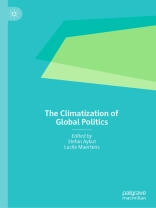This volume examines the process through which climate change is transforming global governance, as both an increasingly central issue on the international stage and an increasingly structured policy domain with its specific modes of governing, networks of actors, discourses, and knowledge practices. Collectively, the contributions aim to assess how and why climate change is becoming a dominant frame in international politics. In doing so, they also contribute to understanding the dynamics and drivers of climatization.
As global warming progresses and efforts to mitigate and adapt intensify, living under a changing climate—or in a ‘new climate regime’ (Latour 2015)—increasingly appears as a central feature of ‘our’ new, and highly unequal, human condition in the Anthropocene. In other words, we firmly believe that climatization is here to stay. It is thus crucial to better understand this process, recognizing its problems and ambiguities, but also examining its transformative potential and identifying the conditions under which such potentials can be harnessed with a view to building a more effective and equitable climate politics. We think that the chapters in this book contribute to this endeavour.
Spis treści
Chapter 1. The climatization of global politics: introduction to the special issue.- (Stefan C. Aykut Lucile Maertens).- Chapter 2. ‘Incantatory’ governance: global climate politics’ performative turn and its wider significance for global politics (Stefan C. Aykut Edouard Morena Jean Foyer).- Chapter 3. The climate brokers: philanthropy and the shaping of a ‘US-compatible’ international climate regime.- (Edouard Morena).- Chapter 4. Reversing climatisation: transnational grassroots networks and territorial security discourse in a fragmented global climate governance (Emilie Dupuits).- Chapter 5. Alternative globalities? Climatization processes and the climate movement beyond COPs (Joost de Moor).- Chapter 6. Preparing the French military to a warming world: climatization through riskification (Adrien Estève).- Chapter 7. ‘Climatizing’ military strategy? A case study of the Indian armed forces (Dhanasree Jayaram).- Chapter 8. Climatizing the UN Security Council (Lucile Maertens).
O autorze
Stefan C. Aykut is Professor of Sociology, member of the Cluster of Excellence Climate, Climatic Change, and Society (CLICCS) and Director of the Center for sustainable society research (CSS) at Universität Hamburg, Germany.
Lucile Maertens is Senior Lecturer in Political Science and International Relations at the Institute of Politic Studies of the University of Lausanne, Switzerland, and member of the Center of International History and Political Studies.












